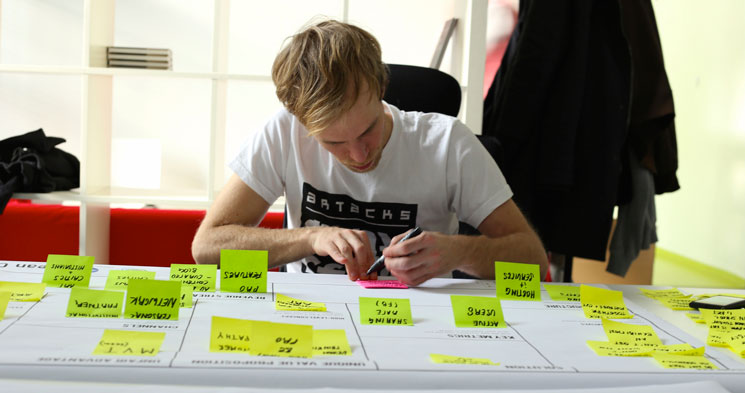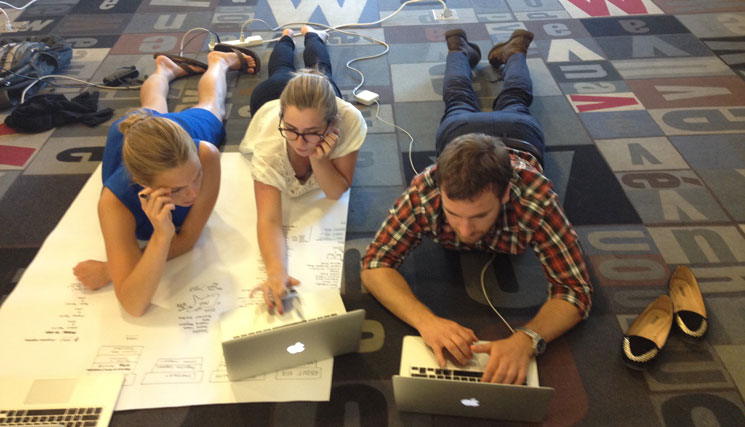Take a moment to reflect on contemporary society and you are likely to be amazed by almost every aspect of it. Myself though, what amazes me the most, is the number of opportunities available at practically every turn. In addition, I’d like to think that we live in a society that is growing heavy with opportunities of any kind. Opportunities, like never before, to develop professionally, financially, become a self-actualized individual.

The change within dictates opportunities
Yet for all this, it seems as though this society has thought us otherwise. It has programed us, in a way, to wait for reward while following a set of rules, instead of chasing opportunities. Society, regardless of how harsh it might sound, owns us nothing. Whatever it is we want for ourselves, we alone must create it.
A friend of mine surprised me with a seemingly simplistic, but nonetheless profound thought:
If there are no jobs, we must create ones by ourselves, out of nothing.
From a society used to wait for guidance, in all likelihood, his line of thinking will be stigmatized. But I digress.
Tracking back though – to what allows us to capitalize on opportunity – we face the necessity to self-improve. For it is precisely through self-improvement that opportunities reveal to us. Evidence is piling up, little by little, that whatever world we live in, is a creation of our own. Through our minds’ eye, the reality changes.
“Everything changes when you change” ~ Jim Rohn
And this line of thinking pertains, without doubt, to personal development in its purest form.
Don’t wait for someone to pick you up
Working on projects, working and meeting other people, delving deep into what excites you… these all encompass the opportunity to develop as a person. By extension, various market circumstances, as well as level of demand allow you to progress, both professionally and financially, if you decide to come forth and meet them half way.
“Pick yourself. Don’t wait for someone to pick you. If you have a book, you don’t need a publisher to pick you, you can publish it yourself; if you want to write, write; if you want to sing, sing; if you want to start a movement, start a movement. You can now make an impact if you want to.” ~ Seth Godin
And both market circumstances and demand are to be followed closely, as more and more entrepreneurs are coming out of the woodwork. You can, both as an individual or part of a team, decide whether to satisfy a need, or work towards creating a better version of something already serving the market.
One of my projects in construction is based primarily on the conclusion that something has worked well, there is a market and a steady demand, so why not create a different, even better version?
Namely, by observing the fitness industry for a while, I’ve noticed that workout programs, like for example Focus T25 or 21 Day Fix are something for which there is a constant demand. This, in itself, constitutes an opportunity. Whether or not I will capitalize on this opportunity, it depends entirely on me.
And this, for the most part, may have to do with will power.
The willpower factor

The amount of will power one can have is something left on the table for discussion. Within reasonable limits, I cannot see why we don’t hope for the best. In other words, we can agree that will power, by virtue of birth is already there, a given.
Where successful people and less so differ though, from what I can tell, is how and where they invest their will power.
And two directions seem to me like the winning bet.
Intentional work is where I notice successful people invest the most will power into. Think about it. Who gets rewarded the most? Who gets all the brownie points? Any way you try to spin it, it turns out that people who invest the most into intentional work or practice are among the most valued and renowned members of society.
Another area where I see successful people investing will power into is being ready to think- or to sound quaintly archaic- to dream. For this too requires tremendous will power. In a post-industrial society, where thinking as a way of work is valued very high, the willingness to sit down and give a thought matters.
When you hear Seth Godin talking about the early stages of his career, none of this seems outlandish. During studies, without the option of actual practice, he and his friends would gather once every week to discuss ideas. To paraphrase, they would come forth with ideas and try to refine them. Will power to think, speculate, dream… One of an entirely new kind.
Environment suitable for opportunities
Opportunities, like anything else in life, depend upon environment in order to exist, grow. In turn, continuing the line of thinking from above, the environment depends entirely upon the individual.
The people that we let influence us; the places we hang around; the degree of diversity, surprise, change, novelty within our life…
A good friend of mine, pianist by profession, gave me an interesting food for thought. To paraphrase, he was confronted by some of his less ambitious colleagues with something in the lines of – of course your performance is getting better, you are probably spending hours upon end practicing while letting life in its full diversity pass you by.
His response is nothing short of unequivocal truth – If I were to be practicing all day, every day, I would be the worst pianist. All awkwardness aside, but diversity, change, novelty, life in its fullest in fact, allow me to become better at my craft.
And more so does this apply to opportunities as well.
The environment within
Second verse same as the first. While opportunities might come to us, we should be trained to see them, recognize them for what they are. When the person is there, I believe, the opportunity knocks on the door.
Whatever else might be said, it is internally that we get ready for opportunities. Our attitude, our core beliefs, the books that we read, the stories that we believe in. As Pat Flynn – a role model of mine says about his fellow online entrepreneur Noah Kaegan – With his eyes, Noah sees another world entirely. He sees opportunities.
Can’t we all train ourselves to see exactly the same?